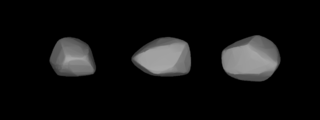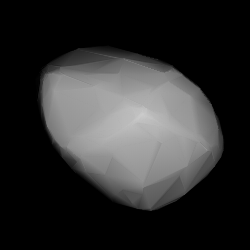Related Research Articles

199 Byblis is a medium-sized main belt asteroid.

312 Pierretta is a 46 km main-belt asteroid discovered on 28 Aug 1891 by Auguste Charlois at Nice.

331 Etheridgea is a large main belt asteroid. It was discovered by Auguste Charlois on 1 April 1892 in Nice. The meaning of the name is unknown. This asteroid is orbiting the Sun at a distance of 3.02 AU with a period of 5.26 years and an eccentricity (ovalness) of 0.10. The orbital plane is tilted at an angle of 6.05° to the plane of the ecliptic.

351 Yrsa is a typical Main belt asteroid. It was discovered by Max Wolf on 16 December 1892 in Heidelberg.
483 Seppina is a minor planet orbiting the Sun.
510 Mabella is a minor planet orbiting the Sun.

533 Sara is a minor planet orbiting the Sun.

534 Nassovia is a minor planet orbiting the Sun. It is a member of the Koronis family of asteroids.

543 Charlotte is a minor planet orbiting the Sun. It was discovered by Paul Götz on September 11, 1904, in Heidelberg.
569 Misa is a minor planet orbiting the Sun.
583 Klotilde is a minor planet orbiting the Sun.
599 Luisa is a minor planet orbiting the Sun.
615 Roswitha is a minor planet orbiting the Sun.

621 Werdandi is a Themistian asteroid.
625 Xenia is a minor planet orbiting the Sun. It was discovered by August Kopff in Heidelberg, Germany, on 11 February 1907. The name may have been inspired by the asteroid's provisional designation 1907 XN.
634 Ute is a minor planet orbiting the Sun.
818 Kapteynia is a minor planet orbiting the Sun. This asteroid is named for the Dutch astronomer Jacobus Kapteyn.

819 Barnardiana is a minor planet orbiting the Sun, discovered on March 3, 1916, by the German astronomer Max Wolf in Heidelberg.
7675 Gorizia, provisional designation 1995 WT5, is a background asteroid from the inner regions of the asteroid belt, approximately 3 kilometers in diameter. It was discovered on 23 November 1995, by the staff at Farra d'Isonzo Observatory in northeastern Italy. It is named for the Italian town of Gorizia.
2021 LL37 is a large trans-Neptunian object in the scattered disc, around 600 kilometres (370 miles) in diameter. It was discovered on 12 June 2021, by American astronomers Scott Sheppard and Chad Trujillo using Cerro Tololo Inter-American Observatory's Dark Energy Camera in Chile, and announced on 31 May 2022. It was 73.9 astronomical units from the Sun when it was discovered, making it one of the most distant known Solar System objects from the Sun as of May 2022. It has been identified in precovery images from as far back as 28 April 2014.
References
- ↑ "609 Fulvia (1906 VF)". JPL Small-Body Database . NASA/Jet Propulsion Laboratory . Retrieved 5 May 2016.